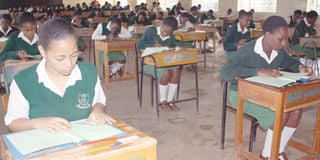Parenting during school holidays: A prescription

Form four candidates of Lugulu Girls High School. The Global Monitoring Report — Education for All 2000-2015 — indicates that more than 40,000 of the 200,000 primary school teachers in public schools (or 20 per cent) do not teach when they are required to. FILE PHOTO | ISAAC WALE |
What you need to know:
- Positive reinforcement of their talents can be done by enrolling them for short courses or classes in their areas of interest. Some parents enroll their music-loving children to music and ballet classes. Others enroll in dance lessons.
- A consensus can be arrived at, on what to watch, and when. School holidays should not be a headache, but an opportunity for family and child growth.
The real essence of school holidays is transfer of teaching and mentoring to the parent. Unfortunately, many parents are ill-prepared for this task.
Others are so busy at work, ostensibly “fending for the family” that there is no time left to spend with that family.
Parents must rise to the challenge- and explore opportunities to provide fun, challenge and excitement to their children during holidays.
As Hodding Carter puts it, “there are two lasting bequests we can hope to give our young people - one of them is roots, the other is wings.” The duty of the parent is, therefore, to ground their children in good virtues, while exhorting them to actualise their talents and soar high.
LEAD BY EXAMPLE
One, parents should lead by example. A teacher leads by example. He tells his/her students to report early for class, and he must be careful to show how. When a parent tells a teenage son to be home early, he ought to show by action.
Secondly, parents should find out their children’s talents, hobbies and aspirations. When they report home from school, ask them what meaningful, enjoyable thing they aspire to undertake during the holidays. Are they interested in skating, for example? Encourage them, cheer them on, and where possible, facilitate them.
Thirdly, children and young adults should be taught the value of charity and helping others. This can form part of what they will do during the holiday. Encourage them to visit and help in a children’s home, old people’s home or hospital. Teach them the value of community service. Church and other religious undertakings should form part of what they do during holidays.
Here, they are more likely to encounter good company, while remaining grounded in good values.
REINFORCE TALENTS
Positive reinforcement of their talents can be done by enrolling them for short courses or classes in their areas of interest. Some parents enroll their music-loving children to music and ballet classes. Others enroll in dance lessons.
Others can undertake short writing courses. This is bound to have a positive impact in their life and school performance.
As much as possible, parents should let children into their lives - the kind of work you do, and the struggles you undergo. This makes for quality time for interaction.
Unfortunately, most parents have no word for their teenage children, and will rarely strike a conversation beyond school fees and performance.
Let them tell you what they feel about you, and what they aspire in school and life.
Finally, the sticky issue of watching television must be addressed. How much should they watch? A consensus can be arrived at, on what to watch, and when. School holidays should not be a headache, but an opportunity for family and child growth.
Dr Paul Bundi Karau is a medical doctor, author and motivational speaker.



